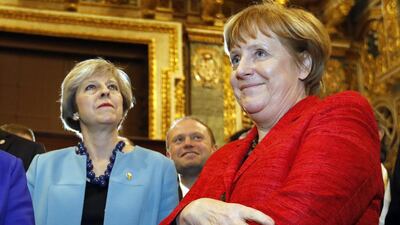The phoney war is over, the day has come, the die is cast and we’re off, with two years to run to goodness knows where. The British prime minister, Theresa May, formally triggers her intention to leave the European Union today, and the country leaps into the unknown, hopeful it will land more or less intact the other side. I hope I am still around to write this column on March 29, 2019 and reflect on the astonishing success or dismal failure of Britain’s journey over this period of intense negotiation. One can’t avoid a sinking feeling that, given the nature of these things, there will be more failure than success about it, although we must travel hopefully.
The financial community, which was strongly on the Remain side, has most to lose and there is already a fierce battle going on to take jobs and business away from the City of London which dominates the European scene. Frankfurt is running hard, although American banks in particular are not keen on German regulations, Luxembourg is presenting itself as a glamorous and exciting centre (which it is not), Paris is offering all its romantic charm, and Dublin wants to pick up some crumbs from the table. All have problems, the big one being they are not London, but banks will undoubtedly move some jobs although not the 200,000 which at one stage was feared. It is more likely to be about a tenth of that, which is neither here nor there – Lloyds Banking Group has shed 45,000 jobs since taking over HBOS and RBS has knocked out 90,000, with more on the way. Yet more people are employed in Britain than at any time in its history.
When Mrs May set out her Brexit prospectus back in January, she defined it as a “truly clean break” with the institutions of the EU, insisting the UK would not seek partial membership, associate membership, or anything that leaves Britain half in or half out. “We do not seek to hold on to bits of membership as we leave,” she declared.
So we must take her at her word and presume that two years from now, Britain is "out". Or should we? Brexit may mean Brexit but in these past few months of trying to make the best of things, it has become all too clear that "out" does not mean "out" at all. For instance, a completely clean break would involve the UK creating at least 34 national regulatory bodies covering areas such as energy, transport and communications – and Britain doesn't have the expertise available to do that. "We wouldn't have the time to start up new agencies from scratch," an official told the Financial Times this week.
Already, even before the start, the going is getting rougher and hidden obstacles are suddenly appearing. The German chancellor, Angela Merkel, seen by Mrs May as her best ally in securing a smooth exit, has unexpectedly turned cold and is taking a tough position on issues such as Britain’s exit bill of potentially €60 billion (Dh239.27bn). And it now looks as if British airlines such as easyJet and BMI will face severe restrictions on their inter-European flights, and may even have to change their ownership status.
EasyJet has set up a new EU-based company at a cost of £10 million (Dh46.2m) to handle its inter-EU flights, but EU officials are now insisting it will have to go further than that and prove it is majority-owned and controlled by EU nationals. It may also have to satisfy two sets of safety regulators, British and EU. That will give its much-hated rival Ryanair, which is based in Ireland, a major advantage.
Hundreds of such issues will turn up over this next year, overwhelming a civil service in Whitehall which is ballooning by the day but still running well behind.
The upside is that, as of today, Britain has the freedom to make new trade deals internationally, many of which of course will be with the EU. Mrs May says she still wants Britain to have a customs agreement with the EU and a “new, comprehensive, bold and ambitious free-trade agreement” with the bloc, and despite Mrs Merkel’s rhetoric, there is a fair chance she will get it. She also wants to maintain the common travel area between Ireland and the North, rather than “return to the borders of the past” which have long been pulled down and would be impossible to reinstate. A huge motorway now snakes between Belfast and Dublin and runs all the way to Cork. There is no way of policing that.
Before the referendum, the Treasury assumed we would get no additional non-EU deals. It is now clear that was wrong. Earlier this year, speaking in Davos, Mrs May revealed that Arabian Gulf countries are interested in striking trade deals, and officials have made clear their intention to place even greater emphasis on Britain’s trade and defence ties with the Gulf. Since then the US, where president Trump is an unexpected ally, Australia, New Zealand, Saudi Arabia, Qatar, UAE and Ghana have all expressed an interest in new trade deals. Other key prizes include China, Japan and India, with South Africa, Brazil and others queuing up behind.
There is much to play for – and much to lose. But there’s no going back now.
Ivan Fallon is a former business editor of The Sunday Times
business@thenational.ae
Follow The National's Business section on Twitter

